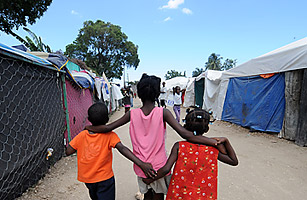
On Jan. 29, weeks after the devastating earthquake in Haiti killed tens of thousands of people, 10 members of a U.S. church group were detained by Haitian authorities for attempting to illegally take 33 children out of the country. The Americans maintained that they were merely trying to rescue the children from Haiti's dangerous streets and take them to an orphanage they were building in the Dominican Republic. "God wanted us to come here to help children; we are convinced of that," said Laura Silsby, a member of the group. "Our hearts were in the right place."
Haitian officials disagree. Prime Minister Jean-Max Bellerive lashed out at the group as "kidnappers" who "knew what they were doing was wrong," though he later conceded the group might have been misguided. Still, authorities are dubious about the Americans' qualifications and are certain that the group did not have permission to take the children out of the country. It also appears that many of the children were not orphans at all, but were placed in the care of the U.S. church group after their families were promised they would have a better life.
Whatever its intentions, the group has angered Haitians who worry about their country's eroding laws and sovereignty, and the move puts a spotlight on the disturbing issue of children who are in real danger. The quake has left thousands of orphans vulnerable to being preyed upon by child traffickers and those who perpetuate Haiti's shameful tradition of keeping child slaves, known as restaveks. The word in Creole means "to stay with," an innocuous term for a far more sinister practice: children "stay with" more-affluent families as slaves, and like most slaves, they're usually subject to physical, emotional and sexual abuse.